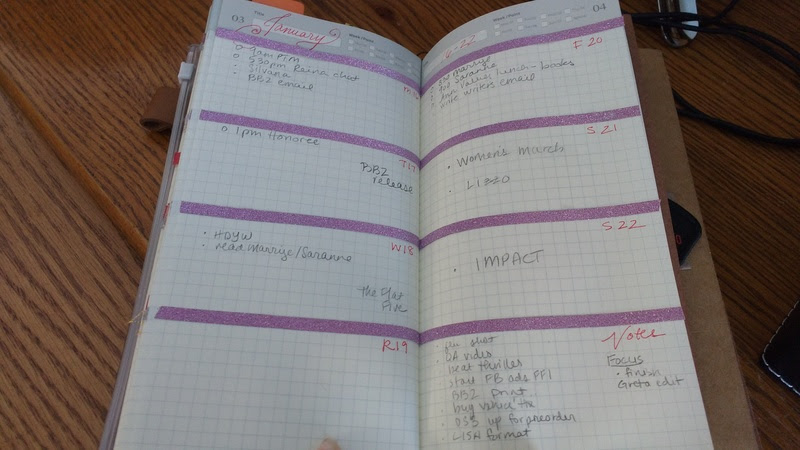[In the effort to blog more often, I might sometimes crosspost my emails meant for my writing group if they feel relevant to my life and are something I’d like to remember later. In that spirit, here’s this post on time management.]
I started tracking my time in earnest this month, and it’s had a huge effect on my life almost instantly. It’s like when I started using You Need a Budget – I’d never really understood money and debt until I started tracking it. TopTracker for time is doing the same thing to my brain, and I’m really thinking about the way I use my hours.
Biggest surprise so far?
A lot of time blocks I didn’t consider work actually are part of my work. Earlier this week, I had to send an international wire transfer to reserve a block of rooms for a Venice writing retreat. I found that my credit union had stopped doing them, and I had to literally switch banks in order to get it done. That was three hours that I would normally have just whined about, three hours lost from my work time.
That banking kerfuffle? That was work time.
Mind = blown.
Did you read the recent article, Why Time Management is Ruining Our Lives?
Oy. To know that even Merlin Mann wishes he hadn’t gone quite so far down the productivity wormhole? That was rough to read.
I worship time management.
I bow at its altar and offer my pittance of minutes stolen from the recesses of my Midori Bullet Journal. Even as a kid, I was obsessed with time management, wringing every possible drop from the hours I was allotted. I loved Cheaper by the Dozen and its look at Frank Bunker Gilbreth Sr’s early study of time and motion. I walked around the house making sure to batch my trips. Going downstairs to get a snack? I’d carry two books that had to go to the living room and bring back upstairs both my snack and my laundry. (This was when I was about nine, mind you.)
So I listened with bated breath this week as Kim Werker told me about her foray into time management with the app Asana. Maybe this would be it! Maybe this would be the one thing that finally got my time whipped into shape.
Because I’ve been needing help.
I’ve always been good at managing my time. I’m not the kind of person who looks down at a pencil and looks up to find the sun is setting outside.
But I’ve been scheduling too much.
I’ve forgotten what I can and can’t do. I’m used to overreaching and just getting what I want right before I fall out of the tree, and I have to say, that method is exhausting and leaves bruises.
Every year, I choose a word that I’ll keep in mind for the next year. 2016’s word was BRAVE because I knew I’d have to be courageous to jump out of my day job (I didn’t know it would take bravery just to get through the damn year itself.)
2017 doesn’t seem to have a word for me. Instead, it has a phrase:
“Can I do less?”
This is totally contrary to what I’ve ever done.
But it feels right.
I’ll still do everything, don’t get me wrong. I have plans to write three (maybe four) books in 2017, and I’m releasing three. I have two podcasts.* I’m teaching at Stanford and Berkeley.* I will write essays for my Patreon (and will, every 6 weeks, hand to god!). I’m creating a new online class.
I can do all this, and still do less within a day. How?
While talking to Kim, she said her assistant had built her schedule for her, including buffer room.
Wiggle room!
I never give myself any of that. My days are constantly scheduled full, from top to bottom. I work right up to every deadline I’ve ever had. When I get a migraine and lose two days, my whole schedule is hosed, and I have to redo everything.
This year, no.
This year, I’m building wiggle room into:
- My deadlines (two weeks of it)
- My weeks (one day a week, unscheduled, to be filled as needed)
- My days (TWO OPEN HOURS planned, every work day. That can be used to do the things I didn’t see coming (and there are always tons of those every week), or to read (part of the job!) or to nap (part of a good life!).)
I’m scheduling three hours of Deep Work (loved the book by Cal Newport) into each morning. That time is strictly to do writing of new words, and revision of old ones. The rest of my work hours are scheduled for tasks, the myriad things that keep my world turning ’round and money flowing in.
Thanks to a suggestion from my mastermind group, I’m going to try to keep one day a week completely unscheduled (besides the deep work time). As it stands right now, that may be a different day each week, but that day can catch some of the flotsam and jetsam of the rest of the week.
I’m going to use a combination of Asana (for the reminders it sends) and my Midori to track my time.

(Above: Midori, with glitter washi tape! I don’t list the deep work on it, only the To Dos. See Thursday for a “free day” during which I’ll do both deep work and regular work, but I have no specific scheduled tasks that day.)
I’m going to give myself more time.
I’m going to schedule down time, every day.
I’ll keep you posted as to how it goes. How about you? How do you plan out your time? I’d love to hear.
xo, Rachael
***
- The world is testing me. As I’m writing this to you, I just got asked to teach a paying gig that is right up my alley, but I do. not. have. time, and I’m going to have to say no to people I care about. Augh.
- I realize that I’m whining about time management when writing is my full time job. I understand the place of privilege I’m in, and boy, do I appreciate it and never take it for granted.
- I have a new writing podcast, did you know? J. Thorn and I are talking about making the transition to writing full time over at The Petal to the Metal. Come listen. We’re funny.
- At Berkeley, one of the classes I’m teaching is in the Extension program and it’s online, so YOU can take it if you want to. It’s called Developing the Novel, and registration is open now. The class starts in two weeks, limited to 20 students.
Join me.
❤️ Let me help you do the work of your heart. ❤️

Two things:
1) The absolute hardest part of living a great life is that you have to kill off the merely good projects to have time for the truly great. This is neither easy nor is it intuitive. Killing off the bad is hard enough, but you know you aren’t getting a good return. Good projects by definition do have a good return. Killing them is HARD. But if the ok-to-good range uses all of your time, you can’t ever reach farther than you already are.
2) Professional autonomy is an ultimate freedom. And also quite a lot of rope with which you can hang yourself. Time management is hard enough when there are external structures defining milestones and holding one accountable. Now you have to be your own manager in addition to being the workforce. And there is a reason that these are usually jobs given to different people.